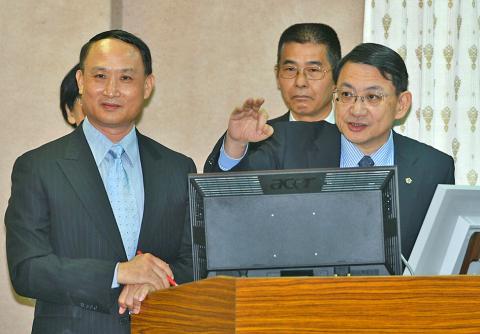A proposal by the Democratic Progressive Party (DPP) to establish a cyberarmy as the fourth branch of the nation’s armed forces yesterday met with resistance from the military establishment and the Chinese Nationalist Party (KMT).
To counter “digital warfare” and the impairment of government agency Web sites — with most attacks originating in China — the DPP recommended in May last year setting up within the Ministry of National Defense a cyberarmy, with its own command headquarters, an initial budget of NT$1 billion (US$30.7 million) and an estimated staff of several thousand.
Most DPP legislators at a meeting of the legislature’s Foreign Affairs and National Defense Committee yesterday spoke in favor of the proposal, but KMT legislators opposed the initiative, saying it would cause division at the ministry.

Photo: Chang Chia-ming, Taipei Times
KMT Legislator Ma Wen-chun (馬文君) said it was a rash idea and the DPP had not considered its ramifications, adding that the ministry would need to consult with other government agencies and avoid disrupting the defense ministry’s existing operations.
Ma said the plan was an attempt to copy the US Cyber Command, an agency subordinate to US Strategic Command that was created in 2009 and has a staff of about 6,200.
“We have to question if this kind of set up is suitable for Taiwan. It will be too draining on the ministry’s human resources and budget, burdening military personnel with additional assignments,” she said.
KMT Legislator Johnny Chiang (江啟臣) quoted reports submitted by various government agencies, which said that the nation’s existing cybersecurity units can deal with most hostile cyberattacks from foreign hackers, but that their capabilities would need to be improved, along with regular upgrades of hardware and software.
Deputy Minister of National Defense Cheng De-mei (鄭德美) said cyberattacks by foreign hackers had damaged to the nation’s digital information networks and are becoming a major concern, and that the unit that handles the task is the Information and Electronic Warfare Command under the Chief of General Staff Office.
Cheng said the office has a staff of about 2,400 and it is headed by a major-general.
“The defense ministry will not take a stance on this issue, but as long as the program helps to protect our national security, we will support it. However, at this time, we have not received explicit guidance on a program to set up a cyberarmy as the fourth branch of the nation’s armed forces,” Cheng said.
National Security Bureau Deputy Director Kuo Chung-hsin (郭崇信) also avoided giving a direct response on the need to of establish a consolidated cyberarmy, while adding that his bureau created its own Internet security division last year.

NO HUMAN ERROR: After the incident, the Coast Guard Administration said it would obtain uncrewed aerial vehicles and vessels to boost its detection capacity Authorities would improve border control to prevent unlawful entry into Taiwan’s waters and safeguard national security, the Mainland Affairs Council (MAC) said yesterday after a Chinese man reached the nation’s coast on an inflatable boat, saying he “defected to freedom.” The man was found on a rubber boat when he was about to set foot on Taiwan at the estuary of Houkeng River (後坑溪) near Taiping Borough (太平) in New Taipei City’s Linkou District (林口), authorities said. The Coast Guard Administration’s (CGA) northern branch said it received a report at 6:30am yesterday morning from the New Taipei City Fire Department about a

IN BEIJING’S FAVOR: A China Coast Guard spokesperson said that the Chinese maritime police would continue to carry out law enforcement activities in waters it claims The Philippines withdrew its coast guard vessel from a South China Sea shoal that has recently been at the center of tensions with Beijing. BRP Teresa Magbanua “was compelled to return to port” from Sabina Shoal (Xianbin Shoal, 仙濱暗沙) due to bad weather, depleted supplies and the need to evacuate personnel requiring medical care, the Philippine Coast Guard (PCG) spokesman Jay Tarriela said yesterday in a post on X. The Philippine vessel “will be in tiptop shape to resume her mission” after it has been resupplied and repaired, Philippine Executive Secretary Lucas Bersamin, who heads the nation’s maritime council, said

REGIONAL STABILITY: Taipei thanked the Biden administration for authorizing its 16th sale of military goods and services to uphold Taiwan’s defense and safety The US Department of State has approved the sale of US$228 million of military goods and services to Taiwan, the US Department of Defense said on Monday. The state department “made a determination approving a possible Foreign Military Sale” to the Taipei Economic and Cultural Representative Office in the US for “return, repair and reshipment of spare parts and related equipment,” the defense department’s Defense Security Cooperation Agency said in a news release. Taiwan had requested the purchase of items and services which include the “return, repair and reshipment of classified and unclassified spare parts for aircraft and related equipment; US Government

More than 500 people on Saturday marched in New York in support of Taiwan’s entry to the UN, significantly more people than previous years. The march, coinciding with the ongoing 79th session of the UN General Assembly, comes close on the heels of growing international discourse regarding the meaning of UN Resolution 2758. Resolution 2758, adopted by the UN General Assembly in 1971, recognizes the People’s Republic of China (PRC) as the “only lawful representative of China.” It resulted in the Republic of China (ROC) losing its seat at the UN to the PRC. Taiwan has since been excluded from